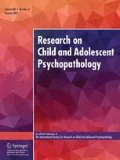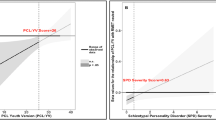Abstract
Although past theory and research implicate social problem- solving deficits in both depression and aggressive disorders, research examining carefully diagnosed groups of adolescent depressed and conduct- disordered groups had not previously been conducted. In the current study three groups of adolescents (major depression, conduct- disordered, and normal) were studied using two social problem- solving measures. Both the Means- Ends Problem- Solving task (MEPS) and the Social Situations Analysis measure (SSA) failed to show social problem- solving problem deficits in the depressed group relative to their normal age peers, but did provide corroborative evidence for social problem- solving deficits in the conduct- disordered sample. Relative to the other two groups, the conduct- disordered adolescents were found to generate fewer means to a social end, to anticipate fewer obstacles in the pursuit of solutions to interpersonal situations, and to generate fewer assertive behavioral solutions to difficult social situations. The results are discussed in relation to other work with depressed and aggressive youth, and directions for future research are given.
Similar content being viewed by others
References
American Psychiatric Association. (1980).Diagnostic and Statistical Manual-III. Washington, DC: Author.
Carlson, G. A., & Cantwell, D. P. (1980). Unmasked depressed in children and adolescents.Archives of General Psychiatry, 137, 445–449.
Connolly, J., Burnstein, S., Stevens, R., & White, D. (1987).Interpersonal skill deficits of emotionally disturbed adolescents: Social problem solving, self-reports of social behavior and self-esteem. Unpublished manuscript, York University, Toronto, Ontario, Canada.
Costello, A. J., Edelbrock, C, Kalas, R., Kessler, M. D., & Kraric, S. H. (1982).The NIMH Diagnostic Interview Schedule for Children (DISC). Unpublished interview schedule, Department of Psychiatry, University of Pittsburgh, Pittsburgh.
Dodge, K. A. (1980). Social cognition and children's aggressive behavior.Child Development, 51, 162–170.
Dodge, K. A., & Newman, J. P. (1981). Biased decision making processes in aggressive boys.Journal of Abnormal Psychology, 90, 375–379.
Doerfler, L. A., Mullins, L. L., Griffin, N. J., Siegel, L. J., & Richards, C. S. (1984). Problemsolving deficits in depressed children, adolescents, and adults.Cognitive Therapy and Research, 8, 489–500.
Fuhrman, M. J. & Kendall, P. C. (1986). Cognitive tempo and behavioral adjustment in children.Cognitive Therapy and Research, 10, 45–50.
Goldfried, M. R., & D'Zurilla, P. J. (1969). The behavioral-analytic method for assessing competence. In C. D. Spielberger (Ed.),Current topics in clinial and community psychology (Vol. 1, pp.-). New York: Academic Press.
Gotlib, I. H., & Asarnow, R. F. (1979). Interpersonal and impersonal problem solving skills in mildly and clinically depressed university students.Journal of Consulting and Clinical Psychology, 47, 86–95.
Kazdin, A. E. (1981). Assessment techniques for childhood depression.Journal of the American Academy of Child Psychiatry, 20, 358–375.
Kendall, P. C. (1985). Toward a cognitive-behavioral model of child psychopathology and a critique of related interventions.Journal of Abnormal Child Psychology, 13, 357–372.
Kendall, P. C., Hollon, S. D., Beck, A. J., Hammen, C. L., & Ingram, R. (1987). Issues and recommendations regarding the use of the Beck Depression Inventory.Cognitive Therapy and Research, 11, 289–299.
Kovacs, M. (1981). Rating scales to assess depression in school-aged children.Acta Paedopsy-chiatrica, 46, 305–315.
Mitchell, J. E., & Madigan, R. J. (1984). The effects of induced elation and depression on interpersonal problem solving.Cognitive Therapy and Research, 8, 277–285.
Mullins, L. L., Siegel, L. J., & Hodges, K. (1985). Cognitive problem solving and life event correlates of depressive symptoms in children.Journal of Abnormal Child Psychology, 13, 305–314.
Nezu, A. M., Nezu, C. M., & Perri, M. G. (1989).Problem-solving therapy for depression: Theory, research and clinical guidelines. New York: Wiley.
Platt, N. J., & Spivack, G. (1975).Manual for the Means End Problem Solving Procedure (MEPS): A measure of interpersonal cognitive problem solving skill. Unpublished manuscript, Hahneman Medical College and Hospital, Philadelphia.
Platt, J., Spivack, G., Altman, N., Altman, D., & Peizer, S. (1974). Adolescent problem solving thinking.Journal of Consulting and Clinical Psychology, 47, 787–793.
Richard, B. A., & Dodge, K. A. (1982). Social maladjustment problem solving in school-aged children.Journal of Consulting and Clinical Psychology, 50, 226–233.
Shure, M. B., Spivack, G., & Jaeger, M. (1971). Problem solving thinking and adjustment among disadvantaged preschool children.Child Development, 42, 1791–1803.
Siegel, J. M., Platt, J. J., & Peizer, S. B. (1976). Emotional and social real-life problem-solving thinking in adolescent and adult psychiatric patients.Journal of Clincial Psychology, 32, 239–232.
Spivack, G., Platt, J. J., & Shure, M. B. (1976).The problem solving approach to adjustment: A guide to research and intervention. San Francisco: Jossey-Bass.
Steinberg, M. S., & Dodge, K. A. (1983). Attributional bias in aggressive adolescent boys and girls.Journal of Social and Clinical Psychology, 1, 312–321.
Wierzbicki, M. (1984). Social skills deficit and subsequent depressed mood in students.Personality and Social Psychology Bulletin, 10, 605–610.
Zemore, R., & Dell, L. W. (1983). Interpersonal problem solving skills and depression-proneness.Personality and Social Psychology Bulletin, 9, 231–235.
Author information
Authors and Affiliations
Additional information
The authors would like to thank Dr. Jennifer Connolly for allowing us to use the SSA, and Liz McCririck and Colleen Lyle, who assisted with manuscript preparation. This manuscript is based in part upon a presentation given at the Annual Meetings of the Canadian Psychological Association, June 1987, and the Association for the Advancement of Behavior Therapy, Boston, November 1987. Part of this study was supported by B.C. Health Care Grant #10 (83-2).
Rights and permissions
About this article
Cite this article
Joffe, R.D., Dobson, K.S., Fine, S. et al. Social problem-solving in depressed, conduct-disordered, and normal adolescents. J Abnorm Child Psychol 18, 565–575 (1990). https://doi.org/10.1007/BF00911108
Revised:
Issue Date:
DOI: https://doi.org/10.1007/BF00911108




